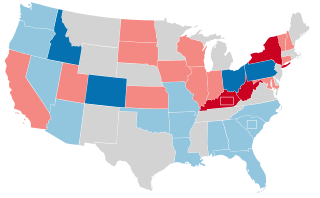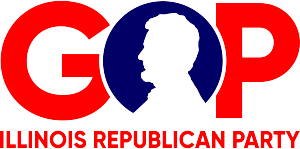A perennial candidate is a political candidate who frequently runs for public office without a reasonable chance of winning. The term is the opposite of an incumbent politician who repeatedly defends their seat successfully. In the U.S., perennial candidates are usually affiliated with third party politics.
Generally speaking, candidates are considered perennial if they seek a specific elected office or general high office (such as president, governor, congressperson or mayor) more than three times without success. [1] [2] [3]
The United States, a representative democracy with low hurdles to running for elected office, has a long tradition of perennial candidates.

The 1984 United States Senate elections were held on November 6, with the 33 seats of Class 2 contested in regular elections. They coincided with the landslide re-election of President Ronald Reagan in the presidential election. In spite of the lopsided presidential race, Reagan's Republican Party suffered a net loss of two Senate seats to the Democrats, although it retained control of the Senate with a reduced 53-47 majority. Democrats defeated incumbents in Illinois and Iowa, and won an open seat in Tennessee, while Republicans defeated an incumbent in Kentucky.

The 1980 United States Senate elections were held on November 4, coinciding with Ronald Reagan's victory in the presidential election. The 34 Senate seats of Class 3 were contested in regular elections. Reagan's large margin of victory over incumbent Jimmy Carter gave a huge boost to Republican Senate candidates, allowing them to flip 12 Democratic seats and win control of the chamber for the first time since the end of the 83rd Congress in January 1955.

The 1976 United States Senate elections was an election for the United States Senate. Held on November 2, the 33 seats of Class 1 were contested in regular elections. They coincided with Democrat Jimmy Carter's presidential election and the United States Bicentennial celebration. Although almost half of the seats decided in this election changed parties, Carter's narrow victory did not provide coattails for the Democratic Party.

The 1972 United States Senate elections were held on November 7, with the 33 seats of Class 2 contested in regular elections. They coincided with the landslide re-election of Republican President Richard Nixon. Despite Nixon's landslide victory, Democrats increased their majority by two seats. The Democrats picked up open seats in Kentucky and South Dakota, and defeated four incumbent senators: Gordon Allott of Colorado, J. Caleb Boggs of Delaware, Jack Miller of Iowa, and Margaret Chase Smith of Maine. The Republicans picked up open seats in New Mexico, North Carolina, and Oklahoma, and defeated one incumbent, William B. Spong Jr. of Virginia.

The 1970 United States Senate elections was an election for the United States Senate. It took place on November 3, with the 33 seats of Class 1 contested in regular elections. Special elections were also held to fill vacancies. These races occurred in the middle of Richard Nixon's first term as president. The Democrats lost a net of three seats, while the Republicans and the Conservative Party of New York picked up one net seat each, and former Democrat Harry F. Byrd Jr. was re-elected as an independent.

The 1968 United States Senate elections were elections for the United States Senate. Held on November 5, the 34 seats of Class 3 were contested in regular elections. They coincided with the presidential election of the same year. Although Richard Nixon won the presidential election narrowly, the Republicans picked up five net seats in the Senate. This saw Republicans win a Senate seat in Florida for the first time since Reconstruction.

The 1964 United States Senate elections were held on November 3. The 33 seats of Class 1 were contested in regular elections. Special elections were also held to fill vacancies. They coincided with the election of President Lyndon B. Johnson by an overwhelming majority, to a full term. His Democratic Party picked up a net two seats from the Republicans. As of 2022, this was the last time either party has had a two-thirds majority in the Senate, which would have hypothetically allowed the Senate Democrats to override a veto, propose constitutional amendments, convict and expel certain officials, or invoke cloture without any votes from Senate Republicans. In practice, however, internal divisions effectively prevented the Democrats from doing so. The Senate election coincided with Democratic gains in the House in the same year.

The 1956 United States Senate elections were elections for the United States Senate that coincided with the re-election of President Dwight D. Eisenhower. The 32 seats of Class 3 were contested in regular elections, and three special elections were held to fill vacancies. Although Democrats gained two seats in regular elections, the Republicans gained two seats in special elections, leaving the party balance of the chamber unchanged.

The 1954 United States Senate elections was a midterm election in the first term of Dwight D. Eisenhower's presidency. The 32 Senate seats of Class 2 were contested in regular elections, and six special elections were held to fill vacancies. Eisenhower's Republican party lost a net of two seats to the Democratic opposition. This small change was just enough to give Democrats control of the chamber with the support of an Independent who caucused with them.

The 1952 United States Senate elections was an election for the United States Senate which coincided with the election of Dwight D. Eisenhower to the presidency by a large margin. The 32 Senate seats of Class 1 were contested in regular elections, and three special elections were held to fill vacancies. The Republicans took control of the Senate by managing to make a net gain of two seats, which was reduced to one when Wayne Morse (R-OR) became an independent. The Republicans still held a majority after Morse's switch. This election was the second time in history that the party in power lost their majority and the Senate majority leader lost his own re-election bid. In addition, this was the third time, as well as second consecutive, in which a sitting Senate leader lost his seat.

The 2006 United States Senate election in West Virginia was held November 7, 2006. Incumbent Democrat Robert Byrd won re-election to a ninth term. He was sworn in on January 3, 2007. However, he died in office on June 28, 2010, before the end of his term. This was Byrd's closest re-election.
In U.S. politics, an independent Democrat is an individual who loosely identifies with the ideals of the Democratic Party but chooses not to be a formal member of the party or is denied the Democratic nomination in a caucus or primary election. Independent Democrat is not a political party. Several elected officials, including members of Congress, have identified as independent Democrats.

The Illinois Republican Party is the affiliate of the Republican Party in the U.S. state of Illinois founded in May 29, 1856. It is run by the Illinois Republican State Central Committee, which consists of 18 members, one representing each of the state's congressional districts. Once the dominant party in Illinois, the state GOP has become a minority party within the last few decades, holding little power in the state. The current chairman is Don Tracy, who has served since 2021.

The 2004 United States elections were held on November 2. Republican President George W. Bush won re-election and Republicans retained control of Congress.

The 2012 United States elections took place on November 6, 2012. Democratic President Barack Obama won reelection to a second term and the Democrats gained seats in both chambers of Congress, retaining control of the Senate even though the Republican Party retained control of the House of Representatives. As of 2022, this is the most recent election cycle in which neither the presidency nor a chamber of Congress changed partisan control, and the last time that the winner of the presidential race provided coattails for their party in both the House of Representatives and the Senate.

The 2016 United States Senate election in Florida was held November 8, 2016 to elect a member of the United States Senate to represent the State of Florida, concurrently with the 2016 U.S. presidential election, as well as other elections to the United States Senate in other states and elections to the United States House of Representatives and various state and local elections. The primary elections for both the Republicans and Democrats took place on August 30, 2016.

The 2020 United States Senate elections were held on November 3, 2020, with the 33 class 2 seats of the Senate contested in regular elections. Of these, 21 were held by Republicans, and 12 by Democrats. The winners were elected to six-year terms from January 3, 2021, to January 3, 2027. Two special elections for seats held by Republicans were also held in conjunction with the general elections: one in Arizona, to fill the vacancy created by John McCain's death in 2018; and one in Georgia, following Johnny Isakson's resignation in 2019. These elections ran concurrently with the 2020 United States presidential election in which incumbent President Donald Trump lost to Democratic nominee Joe Biden.

The 2018 Massachusetts gubernatorial election took place on November 6, 2018, to elect the governor and lieutenant governor of the Commonwealth of Massachusetts. Republican Governor Charlie Baker and Lieutenant Governor Karyn Polito sought reelection to a second term in office, facing Democratic challengers Jay Gonzalez and Quentin Palfrey, respectively. Candidates were selected in the primary election held on September 4, 2018.

The 2018 United States Senate election in Utah took place on November 6, 2018, to elect a member of the United States Senate to represent the State of Utah, concurrently with other elections to the United States Senate, elections to the United States House of Representatives, and various state and local elections. The primaries took place on June 26.

The 2021 United States elections were held in large part on Tuesday, November 2, 2021. This off-year election included the regular gubernatorial elections in New Jersey and Virginia. In addition, state legislative elections were held for the New Jersey Legislature and Virginia House of Delegates, along with numerous state legislative special elections, citizen initiatives, mayoral races, and a variety of other local elections. Six special elections to the United States House of Representatives also took place on November 2 or earlier as a result of either deaths or vacancies. The first of these was held on March 20.
The nineties also saw the first openly transgender person in a state office, Althea Garrison, elected in 1992 but serving only one term in Massachusetts' House.